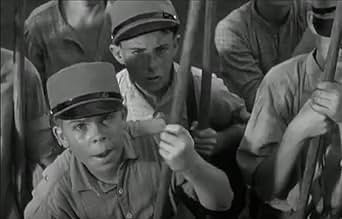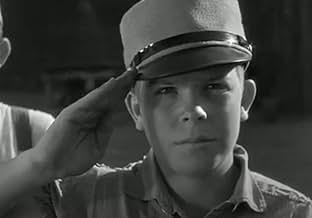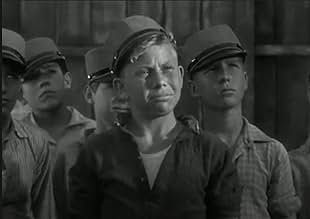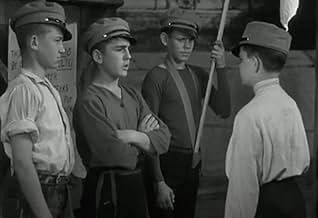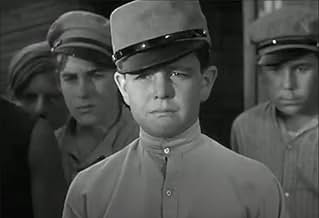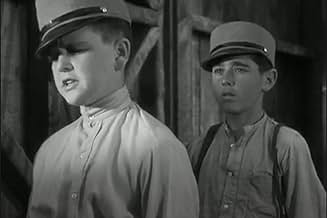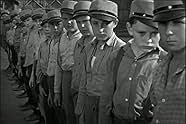Füge eine Handlung in deiner Sprache hinzuFrail Nemecsek, a lonely boy craving belonging, idolizes charismatic Boka, leader of a gang, in an evocative depiction of youth's pain and war's senselessness.Frail Nemecsek, a lonely boy craving belonging, idolizes charismatic Boka, leader of a gang, in an evocative depiction of youth's pain and war's senselessness.Frail Nemecsek, a lonely boy craving belonging, idolizes charismatic Boka, leader of a gang, in an evocative depiction of youth's pain and war's senselessness.
- Regie
- Drehbuch
- Hauptbesetzung
- Auszeichnungen
- 3 Gewinne & 1 Nominierung insgesamt
George P. Breakston
- Nemecsek
- (as George Breakston)
Jimmy Butler
- Boka
- (as Jimmie Butler)
Samuel S. Hinds
- Father
- (as Samuel Hinds)
Empfohlene Bewertungen
This is a bizarre and very heavy-handed film. Instead of showing adults at war, this film does war on a small scale--with children playing war. This isn't just kids playing war, but they have ranks, follow orders and act much like adults would in war. And, almost the entire film consists of kids acting--with only a few adults here and there. This strange idea seemed to impress most of the reviewers but I couldn't get into it--mostly because it all seemed rather fake and I also thought that children playing war and acting as if it's all lots of fun just seemed a bit grotesque. Although I know it was meant as an allegory about war and heroism and the futility of war--it seemed like it could also be taken as a pro-war film as well! As for the kids, all but Frankie Darro were unknowns and the acting, for kids, was pretty good. But it was also sappy from start to finish--and also made war seem pretty cool--like a recruitment film for the next war.
I guess I am a voice of dissent, but I didn't like the film--though I did at least respect the acting (for the most part) and give it a 4 simply for technical merit. Also, I nominate George P. Breakston for a special award for Best Performance By a Crazy Kid for his acting at the 61 minute mark. It has to be seen to be believed. Further, I nominate all the parents for the Most Irresponsible Parenting award for encouraging their little ragamuffins to become little warmongers.
I guess I am a voice of dissent, but I didn't like the film--though I did at least respect the acting (for the most part) and give it a 4 simply for technical merit. Also, I nominate George P. Breakston for a special award for Best Performance By a Crazy Kid for his acting at the 61 minute mark. It has to be seen to be believed. Further, I nominate all the parents for the Most Irresponsible Parenting award for encouraging their little ragamuffins to become little warmongers.
In a busy military hospital, one German soldier bemoans participating in a deadly World War, shouting out, "Patriotism is a loathsome lie!" Then, the story dissolves to a Hungarian schoolteacher telling his young students, "There is nothing finer than Patriotism, nothing nobler than War in defense of the country!" Keeping a few of the boys after school, for passing notes, reveals they are part of a gang. They are "The Paul Street Boys", and they are being threatened by older teenage gang "The Red Shirts" who want to take control of a vacant lot. The lot is the only one left in the neighborhood where the gang can meet and play. "The Paul Street Boys" like to play war games.
Most of the two dozen members of the gang are officers. Only small but determined George Breakston (as Erno Nemecsek), remains a "Private". Young blonde Breakston is the smallest because he won't wear heels. He's also clumsy and admits to being afraid - but "Nemecsek" possesses an enviable amount of determination. Despite being made a scapegoat in the group, Breakston admires "The Paul Street Boys" courageous leader Jimmy Butler (as Boka), who is reelected over a scheming Jackie Searl (as Gereb). Young Searl gets only two votes, from himself and the confident winner.
The boys are playing marbles when "The Red Shirts" cocky leader Frankie Darro (as Feri Ats) arrives on screen. Mr. Darro is obviously going to be hard to beat. Darro has already made inroads; working for the enemy, Searl lets Darro sneak into the "Paul Street Boys" lot and steal their flag. That evening, Breakston volunteers for a dangerous mission - to accompany leader Butler and banana lover Donald Haines (as Csonakos) to "The Red Shirts" camp, and bring back their flag. You'll have to see for yourself how successful they are, but you can be sure the gangs go to War...
An interesting side effect of Breakston's capture is the respect Darro has for his enemy's heroics. Breakston would find himself a more valued member of Darro's gang, but never wavers in his support for Butler. These relationships are highly intriguing. You can probably read a lot of different things in the allegorical story (my favorite "reading" is of "Nemecsek" as Jewish, but there are other interpretations). This film is clearly from a superior source, even without the introduction, "From Ferenc Molnar's immortal book." As it turns out, this is a classic novel from Hungry. For upshot Columbia Pictures, director Frank Borzage, photographer Joseph August, and editor Viola Lawrence excel.
Each of the performers are outstanding, with an amazing lead by Breakston. He may tend toward the sentimental, but plays it as directed. The producers and/or Mr. Borzage seem to have added an "All Quiet on the Western Front" type opening, which partially works; really, the story was strong enough as is. Also regrettable is the decision to intentionally speed up the film in selected parts. Incredibly, this received an homage in the opening of the excellent 1969 re-make, which was nominated for an "Academy Award" in the foreign language category.
******** No Greater Glory (3/14/34) Frank Borzage ~ George Breakston, Jimmy Butler, Frankie Darro, Jackie Searl
Most of the two dozen members of the gang are officers. Only small but determined George Breakston (as Erno Nemecsek), remains a "Private". Young blonde Breakston is the smallest because he won't wear heels. He's also clumsy and admits to being afraid - but "Nemecsek" possesses an enviable amount of determination. Despite being made a scapegoat in the group, Breakston admires "The Paul Street Boys" courageous leader Jimmy Butler (as Boka), who is reelected over a scheming Jackie Searl (as Gereb). Young Searl gets only two votes, from himself and the confident winner.
The boys are playing marbles when "The Red Shirts" cocky leader Frankie Darro (as Feri Ats) arrives on screen. Mr. Darro is obviously going to be hard to beat. Darro has already made inroads; working for the enemy, Searl lets Darro sneak into the "Paul Street Boys" lot and steal their flag. That evening, Breakston volunteers for a dangerous mission - to accompany leader Butler and banana lover Donald Haines (as Csonakos) to "The Red Shirts" camp, and bring back their flag. You'll have to see for yourself how successful they are, but you can be sure the gangs go to War...
An interesting side effect of Breakston's capture is the respect Darro has for his enemy's heroics. Breakston would find himself a more valued member of Darro's gang, but never wavers in his support for Butler. These relationships are highly intriguing. You can probably read a lot of different things in the allegorical story (my favorite "reading" is of "Nemecsek" as Jewish, but there are other interpretations). This film is clearly from a superior source, even without the introduction, "From Ferenc Molnar's immortal book." As it turns out, this is a classic novel from Hungry. For upshot Columbia Pictures, director Frank Borzage, photographer Joseph August, and editor Viola Lawrence excel.
Each of the performers are outstanding, with an amazing lead by Breakston. He may tend toward the sentimental, but plays it as directed. The producers and/or Mr. Borzage seem to have added an "All Quiet on the Western Front" type opening, which partially works; really, the story was strong enough as is. Also regrettable is the decision to intentionally speed up the film in selected parts. Incredibly, this received an homage in the opening of the excellent 1969 re-make, which was nominated for an "Academy Award" in the foreign language category.
******** No Greater Glory (3/14/34) Frank Borzage ~ George Breakston, Jimmy Butler, Frankie Darro, Jackie Searl
This forgotten little family / children's film is about bigger adult issues. This sweet film is about acceptance of those who are different. It uses so much symbolism and so many metaphors it seems is seems like the whole cast is on a soap box. But it's worth it. During the heart of the Great Depression with a pending war in Europe these issues needed to be raised by those who would be fighting for them just ten years later. Two rival gangs of school boys are at war over the same vacant lot as the only place left for them to play. The writer and director focus on the world as the boys see it and so the audience is brought inside the walls of the fort and the earnest issues of homeland, friendship, loyalty and tolerance. An almost too sweet story unfolds and we get to know these youngsters and are touched by their views. I recommend this film and thank Cinesation, the annual Silent & Early Film Festival held in Michigan each fall for playing it on the big screen!
Is this an allegory? Is it intended to show the futility of war? Is it just a story of a moment of boys' life? Supposedly it is somewhat autobiographical, a story by Ferenc Molnar.
Whatever its intent, and I suppose a viewer is allowed to see what he wants, it is a moving and beautifully done film.
There is one very sad irony: Jimmy Butler, who gives a magnificent performance, and who shows so much talent you just know he is going to be a big star, was later a casualty of the real war, World War II.
He shows astonishing presence, especially for one so young -- he was 13 when "No Greater Glory" was released -- and gave a performance not surpassed by many adults.
Frankie Darro, sometimes billed as "Darrow," was nearly always simply great (You must see him in "Wild Boys of the Road," where he performs surely the first "break dance" on film.), and he is a stand-out here.
Ralph Morgan and Lois Wilson are wonderful as parents of the boy played by George Breakston, just heartbreaking as they wish their little son recovery from his illness.
Really, even when an occasional player is less than great, this movie and the portrayals are enthralling.
Turner Classic Movies is to be commended for letting us see this.
Whatever its intent, and I suppose a viewer is allowed to see what he wants, it is a moving and beautifully done film.
There is one very sad irony: Jimmy Butler, who gives a magnificent performance, and who shows so much talent you just know he is going to be a big star, was later a casualty of the real war, World War II.
He shows astonishing presence, especially for one so young -- he was 13 when "No Greater Glory" was released -- and gave a performance not surpassed by many adults.
Frankie Darro, sometimes billed as "Darrow," was nearly always simply great (You must see him in "Wild Boys of the Road," where he performs surely the first "break dance" on film.), and he is a stand-out here.
Ralph Morgan and Lois Wilson are wonderful as parents of the boy played by George Breakston, just heartbreaking as they wish their little son recovery from his illness.
Really, even when an occasional player is less than great, this movie and the portrayals are enthralling.
Turner Classic Movies is to be commended for letting us see this.
No Greater Glory is Frank Borzage's adaption of a biographical novel by Ferenc Molnar. It's set in the postwar depression that Germany had after World War I. As it opens we first see a veteran talking about the futility of war and then it cuts to a German school where the boys, there are no women in this film other than the lead character's mother, are being spoonfed the same militaristic propaganda that sent Lew Ayres and his friends off to the trenches.
These kids learn well and Lord of the Flies like they split into communities, rival communities that we call gangs. The gang we first meet is the Paul Street Boys and their leader Jimmy Butler. Another group of slightly older kids are trying to push these kids out of the vacant lot that the Paul Street kids play in. This means war and these kids have developed their own rules about it.
One kid, small and scrawny George Breakston wants so much to belong to the gang, but the others tease him and tell him he's too little. He spends the rest of the film trying to prove himself worthy.
No Greater Glory is a really heartbreaking film about kids with misplaced values, the kind who would later become good recruiting fodder for the Nazis. Breakston's performance will elicit tears from the stone lions at the New York Public Library. Frankie Darro and Butler as the rival gang leaders do well by their roles.
I'd love to know how Frank Borzage got Harry Cohn at Columbia Pictures to OK this project. It's a B film, no big stars involved at all, still it's not the most commercial of projects. Yet if you do see it, you will discover a classic.
These kids learn well and Lord of the Flies like they split into communities, rival communities that we call gangs. The gang we first meet is the Paul Street Boys and their leader Jimmy Butler. Another group of slightly older kids are trying to push these kids out of the vacant lot that the Paul Street kids play in. This means war and these kids have developed their own rules about it.
One kid, small and scrawny George Breakston wants so much to belong to the gang, but the others tease him and tell him he's too little. He spends the rest of the film trying to prove himself worthy.
No Greater Glory is a really heartbreaking film about kids with misplaced values, the kind who would later become good recruiting fodder for the Nazis. Breakston's performance will elicit tears from the stone lions at the New York Public Library. Frankie Darro and Butler as the rival gang leaders do well by their roles.
I'd love to know how Frank Borzage got Harry Cohn at Columbia Pictures to OK this project. It's a B film, no big stars involved at all, still it's not the most commercial of projects. Yet if you do see it, you will discover a classic.
Wusstest du schon
- WissenswertesJimmy Butler was killed during World War II on February 18, 1945 in France.
- VerbindungenEdited from Im Westen nichts Neues (1930)
Top-Auswahl
Melde dich zum Bewerten an und greife auf die Watchlist für personalisierte Empfehlungen zu.
- How long is No Greater Glory?Powered by Alexa
Details
- Laufzeit
- 1 Std. 14 Min.(74 min)
- Farbe
- Seitenverhältnis
- 1.37 : 1
Zu dieser Seite beitragen
Bearbeitung vorschlagen oder fehlenden Inhalt hinzufügen

